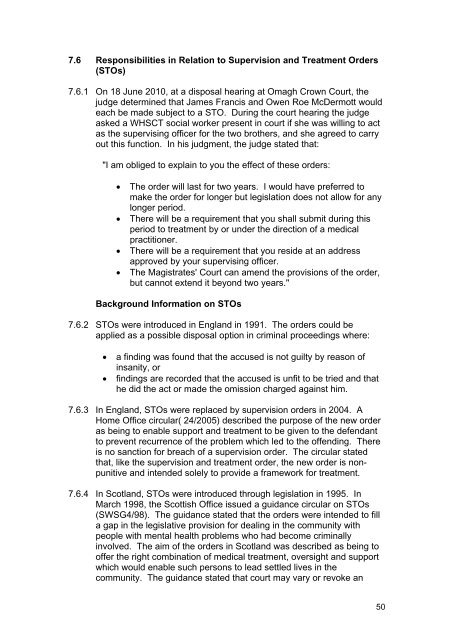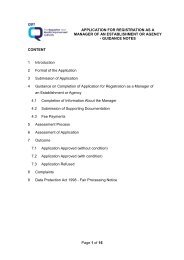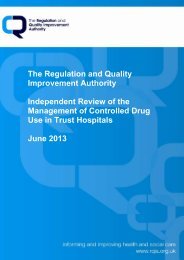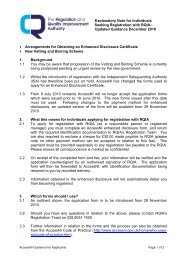RQIA Independent Review of The McDermott Brothers' Case
RQIA Independent Review of The McDermott Brothers' Case
RQIA Independent Review of The McDermott Brothers' Case
Create successful ePaper yourself
Turn your PDF publications into a flip-book with our unique Google optimized e-Paper software.
7.6 Responsibilities in Relation to Supervision and Treatment Orders<br />
(STOs)<br />
7.6.1 On 18 June 2010, at a disposal hearing at Omagh Crown Court, the<br />
judge determined that James Francis and Owen Roe <strong>McDermott</strong> would<br />
each be made subject to a STO. During the court hearing the judge<br />
asked a WHSCT social worker present in court if she was willing to act<br />
as the supervising <strong>of</strong>ficer for the two brothers, and she agreed to carry<br />
out this function. In his judgment, the judge stated that:<br />
"I am obliged to explain to you the effect <strong>of</strong> these orders:<br />
• <strong>The</strong> order will last for two years. I would have preferred to<br />
make the order for longer but legislation does not allow for any<br />
longer period.<br />
• <strong>The</strong>re will be a requirement that you shall submit during this<br />
period to treatment by or under the direction <strong>of</strong> a medical<br />
practitioner.<br />
• <strong>The</strong>re will be a requirement that you reside at an address<br />
approved by your supervising <strong>of</strong>ficer.<br />
• <strong>The</strong> Magistrates' Court can amend the provisions <strong>of</strong> the order,<br />
but cannot extend it beyond two years."<br />
Background Information on STOs<br />
7.6.2 STOs were introduced in England in 1991. <strong>The</strong> orders could be<br />
applied as a possible disposal option in criminal proceedings where:<br />
• a finding was found that the accused is not guilty by reason <strong>of</strong><br />
insanity, or<br />
• findings are recorded that the accused is unfit to be tried and that<br />
he did the act or made the omission charged against him.<br />
7.6.3 In England, STOs were replaced by supervision orders in 2004. A<br />
Home Office circular( 24/2005) described the purpose <strong>of</strong> the new order<br />
as being to enable support and treatment to be given to the defendant<br />
to prevent recurrence <strong>of</strong> the problem which led to the <strong>of</strong>fending. <strong>The</strong>re<br />
is no sanction for breach <strong>of</strong> a supervision order. <strong>The</strong> circular stated<br />
that, like the supervision and treatment order, the new order is nonpunitive<br />
and intended solely to provide a framework for treatment.<br />
7.6.4 In Scotland, STOs were introduced through legislation in 1995. In<br />
March 1998, the Scottish Office issued a guidance circular on STOs<br />
(SWSG4/98). <strong>The</strong> guidance stated that the orders were intended to fill<br />
a gap in the legislative provision for dealing in the community with<br />
people with mental health problems who had become criminally<br />
involved. <strong>The</strong> aim <strong>of</strong> the orders in Scotland was described as being to<br />
<strong>of</strong>fer the right combination <strong>of</strong> medical treatment, oversight and support<br />
which would enable such persons to lead settled lives in the<br />
community. <strong>The</strong> guidance stated that court may vary or revoke an<br />
50
















